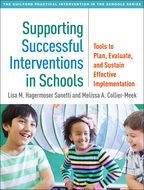Supporting Successful Interventions in Schools
Tools to Plan, Evaluate, and Sustain Effective Implementation
Lisa M. Hagermoser Sanetti and Melissa A. Collier-Meek
A Paperback Originale-bookprint + e-book
A Paperback Original
orderFebruary 25, 2019
ISBN 9781462537730
Price: $43.00 274 Pages
Size: 8" x 10½"
Evidence-based interventions benefit learners only when they are implemented fully. Yet many educators struggle with successful implementation. This unique book gives practitioners a research-based framework for working with PreK–12 educators to support the effective delivery of academic, behavioral, and social–emotional interventions. Step-by-step procedures are presented for assessing existing implementation efforts and using a menu of support strategies to promote intervention fidelity. In a large-size format for easy photocopying, the book includes 28 reproducible worksheets, strategy guides, and fidelity assessment tools. Purchasers get access to a Web page where they can download and print the reproducible materials.
This title is part of The Guilford Practical Intervention in the Schools Series, edited by Sandra M. Chafouleas.
“Should be a mandatory resource for any professional who provides, supports, or evaluates school-based interventions. Uniquely designed for trainees and practitioners of all levels, this book serves as a step-by-step guide for engaging in best practices associated with measuring, supporting, and evaluating treatment integrity. The valuable downloadable tools can be used repeatedly prior to, during, and following intervention implementation. I will absolutely use this book in my master’s-level course on academic interventions.”
—Matthew DuBois, PhD, NCSP, Department of Psychological Services, Public Schools of Brookline, Massachusetts
“Amid the understandable clamor for evidence-based interventions, the elephant in the room is the conspicuous lack of equal emphasis on supporting effective implementation. This book provides practical concepts and worksheets practitioners can use to put in place any of six strategies to increase fidelity. This book is the missing piece to successful implementation. It serves as an essential companion to any text or reference on academic and behavioral interventions. Graduate students will be better prepared if exposed to its content. Practitioners should consider this a primary reference for active practice in schools.”
—W. Alan Coulter, PhD, Director, TIERS Group (Teams Intervening Early to Reach all Students), Louisiana State University Health Sciences Center–New Orleans
“This book offers a practical guide to fostering successful implementation of interventions, with the goal of shifting student performance. It is an important contribution for professionals dedicated to putting evidence-based practices in place with integrity. Honoring the complexity of implementation, the book shows how to use feasible, efficient strategies during consultation and coaching to ensure—and sustain—intervention fidelity.”
—Kathleen Lynne Lane, PhD, BCBA-D, Department of Special Education, University of Kansas
“Sanetti and Collier-Meek offer an up-to-date, detailed description of how to provide effective consultation or coaching to implementers, with excellent visuals and helpful worksheets. The book is infused with the latest research on adult behavior change to assist in enhancing implementation of effective practices and troubleshooting common problems.”
—Kent McIntosh, PhD, Philip H. Knight Chair of Special Education, University of Oregon; Co-Director, Center on Positive Behavioral Interventions and Supports
Table of Contents
I. Fundamentals1. Introduction to Intervention Implementation
2. Overview of Implementation Support and Evaluation within a Problem-Solving Model
II. Evaluation of Intervention Fidelity and Learner Outcomes
3. Intervention Fidelity Data Collection
4. Data-Based Decision Making: Considering Intervention Fidelity and Learner Outcomes Data
III. Implementation Support Strategies
6. Direct Training
7. Participant Modeling and Role Play
8. Self-Monitoring
9. Motivational Interviewing
10. Performance Feedback
IV. Putting It All Together
11. Managing Implementation Supports to Improve Student Achievement, with Ashley M. Boyle
References
Index
About the Authors
Lisa M. Hagermoser Sanetti, PhD, BCBA, is Professor of School Psychology in the Department of Educational Psychology at the Neag School of Education, University of Connecticut. She is Co-Director of the Sustain Collaborative, which conducts research and shares resources to support educators and administrators to implement effective practices and maximize positive student outcomes. Dr. Sanetti is a Board Certified Behavior Analyst. She is a fellow of Division 16 of the American Psychological Association, from which she received both the Lightner Witmer and Thomas Oakland Awards for her scholarship in school psychology. Dr. Sanetti is also an inducted member of the Society for the Study of School Psychology. She is the author of over 100 journal articles and book chapters, as well as an edited collection on intervention fidelity, and has made over 200 professional presentations.Melissa A. Collier-Meek, PhD, BCBA, is Associate Professor of School Psychology in the Department of Health Studies and Applied Educational Psychology at Teachers College, Columbia University. She is Co-Director of the Sustain Collaborative, which conducts research and shares resources to support educators and administrators to implement effective practices and promote student behavioral and academic outcomes. Dr. Collier-Meek is a Board Certified Behavior Analyst. She is a recipient of the Lightner Witmer Award for early-career scholarship in school psychology from Division 16 of the American Psychological Association and is an inducted member of the Society for the Study of School Psychology. Dr. Collier-Meek is the author of over 70 journal articles and book chapters and has made over 150 professional presentations.

